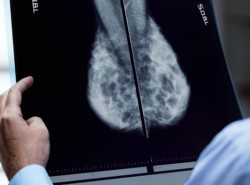
Assessing the impact of ActionPlan, a tailored digital resource for individuals at high risk of breast cancer
Published: 04/30/24 8:20 AM

Alison Trainer
Project Description:
Individuals with BRCA1/2 or PALB2 gene faults have very high risks of developing breast cancer and must make complex decisions on how to manage their increased risk, including deciding whether to undertake risk reducing therapeutic interventions and whether to inform family members who may then elect to undergo genetic testing (cascade testing). A/Prof Trainer will evaluate the clinical utility of a digital health tool called “ActionPlan’’ to help individuals at high-risk and their families, work together with their clinicians to make informed decisions on how to manage their risks, optimise strategies to maximise breast cancer prevention and/or early detection, to ultimately reduce breast cancer mortality.
Why is this work needed:
Identifying individuals with BRCA mutations who do not yet have cancer and supporting them to manage their risk is effective in reducing breast cancer-related deaths. Most studies focus on providing risk assessments, rather than supporting individuals in their decision-making. “ActionPlan” is the first evidence-based, comprehensive website to support individuals at highest breast cancer risk, due to a mutation in BRCA1/2 or PALB2, make, together with their health care specialists, informed decisions on how to manage their breast cancer risk.
Expected outcomes:
The successful outcome of this study will be the roll-out of a web-based clinical health tool called “Action Plan” as a supplement to standard care with the aim of helping people at high risk of breast cancer make informed decisions about their health and wellbeing with their health care specialists. Furthermore, it will improve communication with health care specialists and family.
Project description:
Individuals with BRCA1/2 or PALB2 gene faults have very high risks of developing breast cancer and must make complex decisions on how to manage their increased risk, including deciding whether to undertake risk reducing therapeutic interventions and whether to inform family members who may then elect to undergo genetic testing (cascade testing).
Prior research by A/Prof Alison Trainer at the Peter MacCallum Cancer Centre and the team led to the development of a digital health tool called “ActionPlan’’. ActionPlan provides easy access to lifelong clinical, psychological, reproductive information, the latest research, and communication tools presented in a format that provides people with the opportunity, capability, and motivation to manage their risk.
This project aims to help individuals at high-risk and their families to work together with their clinicians to make informed decisions on how to manage their risks, optimise strategies to maximize breast cancer prevention and/or early detection, ultimately to reduce breast cancer mortality.
With NBCF support, A/Prof Alison Trainer and the team seeks to assess the impact that ActionPlan has, when offered in addition to standard care, on helping individuals make decision about their clinical care and overall wellbeing. The study will also assess the ease of accessibility, acceptability and effectiveness of the ActionPlan at supporting individuals living with an in increased breast cancer risk and how best to optimise ActionPlan’s design.